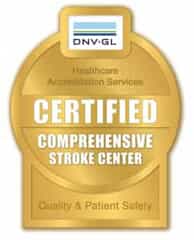Stroke Care
At Adventist Health Glendale, we recognize that stroke is a serious threat to the health and well-being of our community and is one of the leading causes of death and disability in the U.S. That's why we've taken steps to ensure that Adventist Health Glendale provides stroke care that meets and exceeds national standards for the treatment of stroke patients and focuses on helping you recover and get back to your life.
As a result of this commitment to excellence, Adventist Health Glendale was the first hospital in California to receive certification as a Comprehensive Stroke Center by DNV GL Healthcare USA, Inc. By earning this prestigious accreditation, the hospital has demonstrated that our stroke program exceeds patient safety standards set by the U.S. Centers for Medicare & Medicaid Services, the Brain Attack Coalition and the American Stroke Association.
Our Services
The Adventist Health Glendale Stroke Program specializes in the diagnostic and therapeutic care of patients with problems in the blood vessels of the brain, including:
- Ischemic stroke - Results from an obstruction in a blood vessel supplying blood to the brain.
- Transient ischemic attack (TIA, or "mini-stroke") - A temporary blockage in a blood vessel supplying blood to the brain, usually lasting only a few minutes. A TIA can be a warning sign of stroke.
- Carotid stenosis - Narrowing of the carotid arteries, which supply blood to the brain, due to atherosclerosis, or build-up of fat, cholesterol and other substances in the blood stream.
- Cerebral hemorrhage - Bleeding inside the brain.
- Aneurysm/Subarachnoid hemorrhage - Weakening in the walls of a blood vessel, which can burst and cause bleeding in the brain.
- Vascular malformation of the brain - An abnormality in the veins or blood vessels of the brain.
Seeking immediate treatment—within 90 minutes—for stroke and symptoms similar to stroke significantly increases a patient's chances for recovery and survival.
Recognize the Signs of a Stroke
- Sudden weakness of the face, arms or legs, especially on one side of the body.
- Sudden trouble walking, loss of balance or coordination.
- Sudden trouble seeing in one or both eyes.
- Sudden confusion, trouble speaking or understanding.
- Sudden severe headache with no known cause.
If you think you or a loved one might be having a stroke, call 9-1-1 IMMEDIATELY. New medications and interventions can minimize damage to the brain if help is sought in time.
Learn more about stroke on our TV show, Healthline:
For a referral to an Adventist Health Glendale neurologist, call (818) 409-8000.
